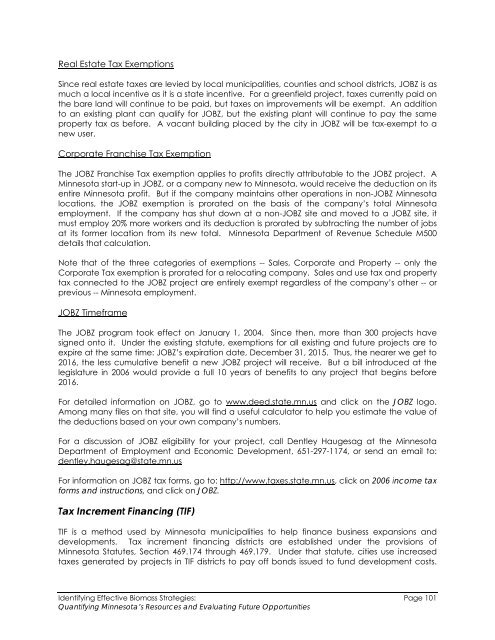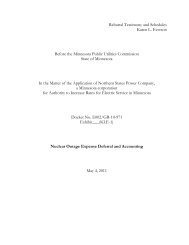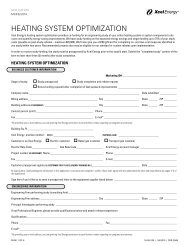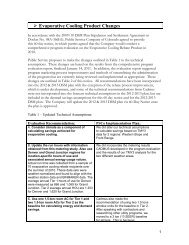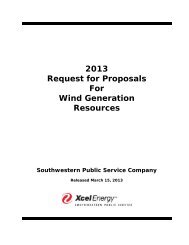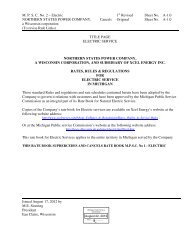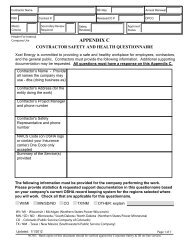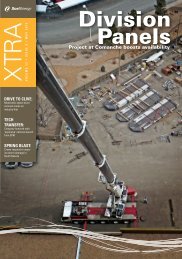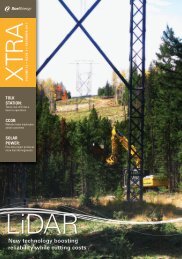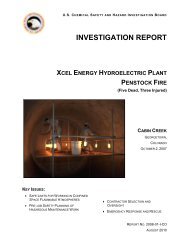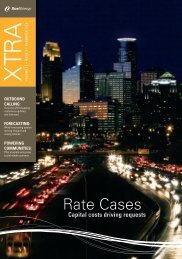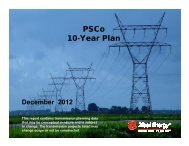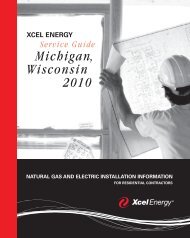Biomass Feasibility Project Final Report - Xcel Energy
Biomass Feasibility Project Final Report - Xcel Energy
Biomass Feasibility Project Final Report - Xcel Energy
You also want an ePaper? Increase the reach of your titles
YUMPU automatically turns print PDFs into web optimized ePapers that Google loves.
Real Estate Tax Exemptions<br />
Since real estate taxes are levied by local municipalities, counties and school districts, JOBZ is as<br />
much a local incentive as it is a state incentive. For a greenfield project, taxes currently paid on<br />
the bare land will continue to be paid, but taxes on improvements will be exempt. An addition<br />
to an existing plant can qualify for JOBZ, but the existing plant will continue to pay the same<br />
property tax as before. A vacant building placed by the city in JOBZ will be tax-exempt to a<br />
new user.<br />
Corporate Franchise Tax Exemption<br />
The JOBZ Franchise Tax exemption applies to profits directly attributable to the JOBZ project. A<br />
Minnesota start-up in JOBZ, or a company new to Minnesota, would receive the deduction on its<br />
entire Minnesota profit. But if the company maintains other operations in non-JOBZ Minnesota<br />
locations, the JOBZ exemption is prorated on the basis of the company’s total Minnesota<br />
employment. If the company has shut down at a non-JOBZ site and moved to a JOBZ site, it<br />
must employ 20% more workers and its deduction is prorated by subtracting the number of jobs<br />
at its former location from its new total. Minnesota Department of Revenue Schedule M500<br />
details that calculation.<br />
Note that of the three categories of exemptions -- Sales, Corporate and Property -- only the<br />
Corporate Tax exemption is prorated for a relocating company. Sales and use tax and property<br />
tax connected to the JOBZ project are entirely exempt regardless of the company’s other -- or<br />
previous -- Minnesota employment.<br />
JOBZ Timeframe<br />
The JOBZ program took effect on January 1, 2004. Since then, more than 300 projects have<br />
signed onto it. Under the existing statute, exemptions for all existing and future projects are to<br />
expire at the same time: JOBZ’s expiration date, December 31, 2015. Thus, the nearer we get to<br />
2016, the less cumulative benefit a new JOBZ project will receive. But a bill introduced at the<br />
legislature in 2006 would provide a full 10 years of benefits to any project that begins before<br />
2016.<br />
For detailed information on JOBZ, go to www.deed.state.mn.us and click on the JOBZ logo.<br />
Among many files on that site, you will find a useful calculator to help you estimate the value of<br />
the deductions based on your own company’s numbers.<br />
For a discussion of JOBZ eligibility for your project, call Dentley Haugesag at the Minnesota<br />
Department of Employment and Economic Development, 651-297-1174, or send an email to:<br />
dentley.haugesag@state.mn.us<br />
For information on JOBZ tax forms, go to: http://www.taxes.state.mn.us, click on 2006 income tax<br />
forms and instructions, and click on JOBZ.<br />
Tax Increment Financing (TIF)<br />
TIF is a method used by Minnesota municipalities to help finance business expansions and<br />
developments. Tax increment financing districts are established under the provisions of<br />
Minnesota Statutes, Section 469.174 through 469.179. Under that statute, cities use increased<br />
taxes generated by projects in TIF districts to pay off bonds issued to fund development costs.<br />
Identifying Effective <strong>Biomass</strong> Strategies: Page 101<br />
Quantifying Minnesota’s Resources and Evaluating Future Opportunities


